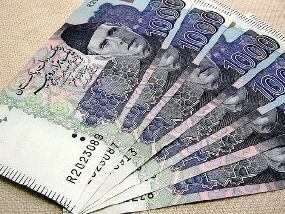
U.S. Taxpayers Help Create Seven Pakistani Billionaires
Pakistan Grabs U.S. Aid - Keeps Taxes Low for its Rich
Reading time: (Number of words: )
According to the Carnegie Endowment’s September 2010, policy brief, less than three million of Pakistan’s 175 million citizens pay any income taxes. Tax avoidance in Pakistan is almost a national sport. Those who do pay taxes do so at rates substantially lower than in the United States. As a result, Pakistan reportedly has at least seven billionaires and thousands of millionaires (the last count being 7,593). Despite this, the U.S. Government continues to shower Pakistan with military, economic and development aid. For fiscal year 2010, the U.S. Government has apparently given or promised Pakistan in excess of $5.5 billion. The total amount cannot be validated due to the different sources of the funds and the lack of transparency within the U.S. State Department and other agencies.
U.S. Ambassador Anne W. Patterson, who was replaced last month, did tepidly criticize the Pakistani tax structure during several speeches this year at Pakistan’s National Defense University; but to no avail. America’s new Ambassador, Cameron Munter, seeking to avoid further embarrassment to the U.S. Government, has publicly avoided the issue.
In the end, U.S. diplomacy was ineffective in prodding Pakistan into taxing its wealthy or its middle class. Pakistani diplomats outmaneuvered their American counterparts and were rewarded with another $5.5 billion in U.S. tax funds. Pakistan did not have to raise taxes or require that 98.3% of its population pay any taxes. As a result the Pakistani rich got richer.
The military consequences of the State Department’s lackluster efforts are significant. Without adequate revenue, Pakistan’s central government cannot hope to fund a credible counterinsurgency effort. At most, all it can continue to do is fund its massive military of 1.4 million troops and use that military to temporarily suppress some of its opponents. The unspoken secret within the U.S. Government is that Pakistan has an anti-terrorism strategy targeting domestic opponents, but no long-term counterinsurgency strategy.
The $5.5 billion provided this year will have been wasted unless it can be matched next year. In addition, the World Bank estimates damage from the current flooding, which began in late July, to be about $9.7 billion, while Voice of America reported on November 15, 2010, that Pakistani officials are claiming that it will take another $30 billion to reconstruct the nation’s infrastructure which was damaged by the disaster. Pakistan will almost certainly turn once again to the United States for these funds. Pakistan will continue to skillfully play the same terrorist fear card against the U.S. Government that the U.S. Government has successfully used for domestic purposes. Pakistan has no incentive to increase its own revenues as long as it can rely on the U.S. Government for limitless funding. Pakistan’s latest scheme, reported just yesterday, is for the United States and the West to waive Pakistan’s $50 billion debt so that it can “continue to combat terrorism.”
The Carnegie Endowment for International Peace concluded its report with the headline: “STOP THE BAILOUTS.” It wrote:
“Pakistan’s elite has no reason to support these (tax) reforms as long as these bailouts come with no conditions attached.”
The counterpoint comes from the Council on Foreign Relations. Its new November 2010, strategy report, drafted by former U.S. Deputy Secretary of State Richard L. Armitage and former Clinton National Security Advisor Sandy Berger, insists that Pakistan should be given even more aid, including a preferential trade deal on textiles. The authors write that:
“By demonstrating American generosity and assistance at a time of grave Pakistani peril, the United States will also make a better case for the strategic benefits of partnership.”
Pakistan may not ultimately prevail against its own Taliban and against al-Qaeda, but it succeeds quite well against amateur U.S. officials.

Poems for the Hazara
The Anthology of 125 Internationally Recognized Poets From 68 Countries Dedicated to the Hazara
Order Now









